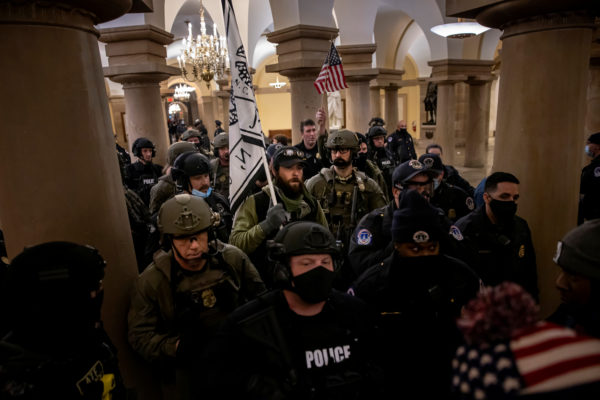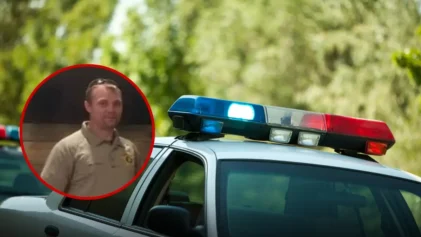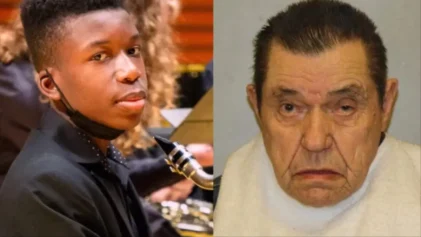As more and more rioters are arrested and charged for their participation in the Jan. 6 insurrection at the U.S. Capitol, some are mounting a new defense. At least 29 rioters facing charges claim the police let them into the building, so they were unaware they were doing anything illegal, ABC News is reporting.
One of those rioters, Christopher Grider of Texas, is being represented by attorney Thomas Mayr as he fights multiple charges, including disorderly conduct and violent entry. Mayr said his client “went through an open door.”

“He was not at the front of the lines, he didn’t see barricades being knocked down, he didn’t see officers getting assaulted, he didn’t see anything other than large crowds at the Capitol,” Mayr told ABC News.
Another riot defendant, Jason Lewis of California, told investigators police “escorted” him into the Capitol building, adding he had footage to “back up his story.” (That footage has yet to be shared with media.)
Still another rioter, Brandon Fellows, told authorities the Capitol Police seemed like they were “on our side.” Federal authorities said they have arrested over 200 rioters, many of whom are white men that said they were being patriots and supporting Trump but didn’t think they engaged in unlawful behavior.
Attorney Taryn Merkl — a former federal prosecutor who is now senior counsel at the Justice Program at the Brennan Center for Justice — said being charged with committing a crime is not dependent on whether it was done knowingly or not.
“Whether or not people knew that it was not lawful to enter the grounds as they did, many are charged with parading, demonstrating, or picketing — and that is prohibited, and no intent is required,” Merkl said.
In Fellows’ case, for example, he entered Sen. Jeff Merkley’s office and put his feet on the Oregon Democrat’s desk. Merkl said Fellows likely knew this was prohibited but did so anyway.
“Even if the officer had permitted him in the rotunda area or somewhere that might conceivably be a public space, anybody knows that breaking into a private senatorial office is wrongful, and would obstruct the administration of government,” Merkl said.
Charles Weisselberg, a law professor at the University of California, Berkeley and former public defender, said using ignorance as a defense can be helpful in some instances.
“If someone believes that they are allowed to do something, it might negate the intent that’s otherwise required to convict,” Weisselberg told ABC News. “Whether it is successful or not depends on the facts, what they heard, saw, and believed, but I could see that being presented.”
However, criminal defense attorney Dimityr Shakhnevich agreed with Merkl. “If I leave my door open to my house, you can’t bolt in, even though I left the door open,” Shakhnevich said. “It’s still trespassing … and making the argument that I impliedly consented to access by leaving my door open is silly.”
Despite the legal opinions, the rioters’ claims underscore looming questions about the Capitol Police’s response to the Jan. 6 riot. Many investigations are underway to determine why officers were not adequately prepared for a threat that had been communicated continually for weeks on social media platforms.
House Speaker Nancy Pelosi said Congress was creating a commission to “the preparedness and response of the United States Capitol Police and other Federal, State, and local law enforcement in the National Capitol Region.” It is a move Merkl believes is necessary.
“I certainly believe that the Capitol Police role in this should be fully investigated, whether it’s by prosecutors or by the House Oversight Committee,” said Merkl, the former federal prosecutor. “There needs to be a review of what the Capitol Police role, if any, was in facilitating this or aiding and abetting it.”
ABC News said the Capitol Police did not respond to its request for comment.


